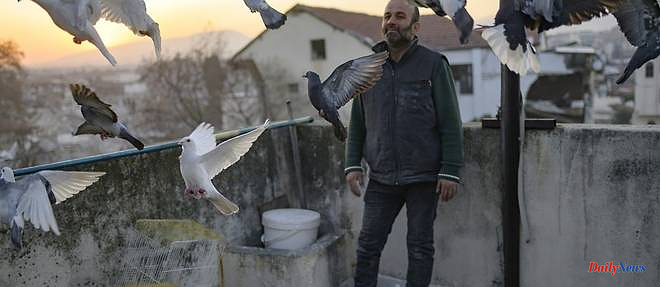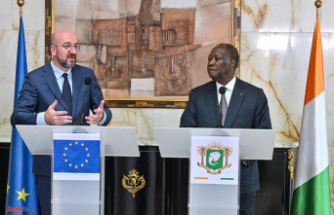At sunset, Murat Güzel scatters bird food on the roof of the restaurant where he worked before the earthquake that struck southern Turkey destroyed his city, Antakya.
Birds of all colors, mostly pigeons, swoop in as soon as Mr. Güzel, 40, calls them.
"We take care of the birds as if they were our children. And we will continue to do so," he says.
On this roof overlooking old Antakya, he now cares for 40 birds, having taken 110 others to the village where he took refuge after the 7.8 magnitude earthquake that devastated the region on February 6.
To reach the roof of this traditional building, Mr. Güzel must pass through a room that suffered from the earthquake, with broken jam jars on the floor, and climb a narrow staircase.
Two large white and brown birds nest in a dovecote, more than 20 others perch on a corner waiting for food.
Before this earthquake, which killed more than 43,000 people in Turkey and Syria, Mr. Güzel was a cook at the Antakya Breakfast House, where customers could enjoy olives and cheese in the courtyard of this old building. 300 years.
"There are five of us at home and everyone is safe and sound." A father of three, Mr. Güzel passed on his passion for birds to his youngest son, Eren.
-"White Rose"-
"Every morning, we come to see our birds to feed them and take care of them," he says.
Reinforced with steel beams, the building suffered only superficial damage while several other buildings were destroyed in the historic heart of the city.
Before the disaster, Antakya was a favored destination for food tourism enthusiasts, with its traditional dishes and desserts reflecting the multiple civilizations that have left their mark there.
Many of the city's orange trees that were able to withstand the shaking are half-buried under the ruins of stone walls and wooden gates.
Holding a white pigeon in his hands which he nicknamed "White Rose", Mr Güzel explains the importance of healthy wings for a bird's survival, while in the distance the sound of diggers can be heard clear away the ruins.
Mr. Güzel inherited his love of birds from his father who, however, abandoned this passion when his son was born.
Pigeon keeping is a very popular traditional activity in southern Turkey, especially in Kurdish-majority areas where the droppings of these birds are used as fertilizer in the cultivation of watermelons.
Mr. Güzel and his brother got their first bird as teenagers and have since added to their collection. "We love them as much as humans. Maybe even more."
Three or four of his birds disappeared after the quake, but were replaced by around 50 others who had taken refuge on the roof where he feeds his pigeons, probably because the people who looked after them died, he says. .
For Mr. Güzel, his pigeons, as well as those from elsewhere, the "visitors", help him to reduce his stress, since the earthquake.
Even if he no longer lives in Antakya, he comes every day from his village to take care of his pigeons. "As long as they're here, I'll be here too," he said.
18/02/2023 16:33:05 - Antakya (Turquie) (AFP) © 2023 AFP












